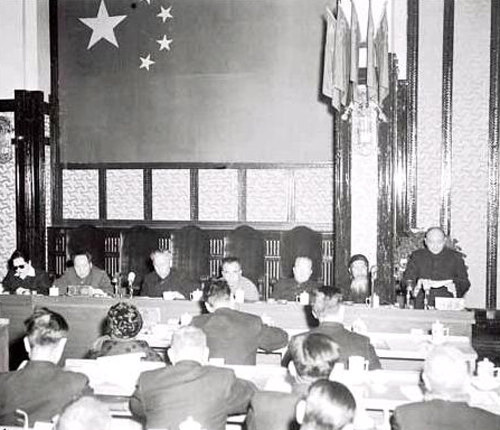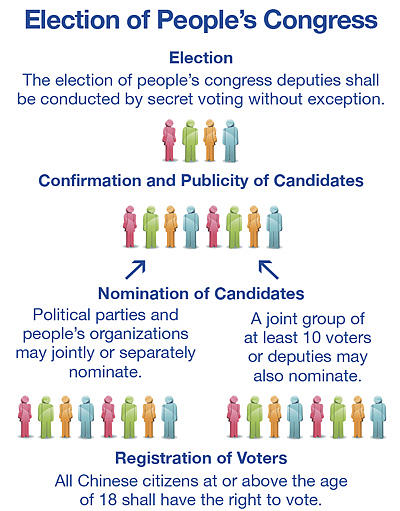 |
|
A NEW START: Deng Xiaoping (first right), then Vice Premier, explains the Electoral Law at the 22nd Meeting of the Central People's Government in Beijing on February 11, 1953 (XINHUA) |
On November 7, 1931, the First People's Congress of the Chinese Soviet Republic, which was established by the Communist Party of China, was held in Ruijin, central China's Jiangxi Province. This provided the basis for the development of the people's congress system of the People's Republic of China (PRC).
In February 1953, the PRC promulgated the Electoral Law. In December 1953, a general election was held. Registered voters accounted for 97 percent of Chinese people above the age of 18, of whom 86 percent, or 278 million, participated in the election.
"The law provided a legal basis and basic principles for China's grassroots elections, such as emphasizing the universality and equality of the right to vote," said Zhang Jincai, a researcher with the Institute of Contemporary China Studies under the Chinese Academy of Social Sciences.
The 1953 Electoral Law stipulates that deputies to people's congresses of cities without districts, districts directly under cities, townships and towns shall be elected directly by their constituencies. In 1979, the Electoral Law was amended, expanding direct elections to the county level, stating that deputies to people's congresses of cities with districts, districts directly under cities, counties, autonomous counties, people's communes (townships) and towns shall be elected directly by their constituencies.
Xu Anbiao, Director of the State Law Office under the Legislative Affairs Commission of the NPC Standing Committee, said that given China's electoral system consists of both direct and indirect elections, direct elections, especially county-level direct elections, are of vital importance.
According to the Electoral Law, direct elections at the county level not only establish country-level people's congresses but also provide the basis for establishing the upper-level people's congresses and even the NPC.
From 1978 to 2008, China held nine township-level direct elections, eight county-level direct elections and six indirect elections of deputies to people's congresses above the county level.
"The people's congress system is China's basic political system and democratic elections are the foundation of the system," said Zhang Chunsheng, an official with the Legislative Affairs Commission of the NPC Standing Committee.
Since 1979, the Electoral Law has been amended five times, in 1982, 1986, 1995, 2004 and 2010, respectively. "The amendments have further improved the people's congress system," Zhang said.
Li Chongan, Vice Chairman of the Central Committee of the China Democratic League, one of eight non-Communist Parties in China, said that the amendments didn't mean the previous versions were flawed. "Every version or amendment is decided by the national conditions prevailing at the time. In the past, national conditions did not allow the election of people's congress deputies based on equal representation of urban and rural population," Li said.
"In the 1950s, farmers accounted for 80 percent of the total Chinese population. If rural and urban areas adopted the same ratio of deputies to the represented population in the election of people's congress deputies, the NPC would have an excessive number of rural deputies," said Li Fei, Deputy Director of the Legislative Affairs Commission of the NPC Standing Committee.
"The election in 1953 was in accordance with the reality of the time. It guaranteed all social segments had their own representatives," he added.
"Today the system must guarantee adequate representation for farmers in legislative bodies. The amendment to the Electoral Law is a meaningful step in this regard," said Zhou Guangquan, a professor at the Law School of Tsinghua University.
Evolution of the Electoral Law
- 1953 The People's Republic of China promulgated its first Electoral Law.
- 1979 The Electoral Law was completely revised, stipulating that each rural deputy to the National People's Congress represents a population eight times that of an urban deputy, while the difference is 5:1 at provincial level and 4:1 at county level.
- 1982 An amendment was adopted, requiring political parties, people's organizations and voters that have nominated candidates for people's congress deputies to brief voters on those candidates at group meetings of voters.
- 1986 An amendment was adopted, allowing a joint group of at least 10 voters or people's congress deputies to recommend candidates and stipulating that the number of candidates for deputies to be directly elected by the voters shall be from one third to 100 percent greater than the number of deputies to be elected.
- 1995 An amendment was adopted, fixing the ratio of rural to urban population for electing a people's congress deputy to 4:1.
- 2004 An amendment was adopted, introducing preliminary elections in direct elections.
- 2010 The Electoral Law was revised again, granting an equal representation ratio for rural and urban residents.

| 